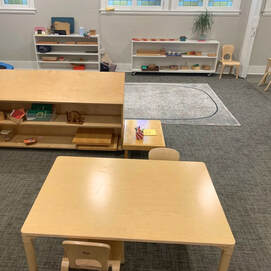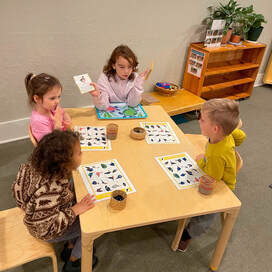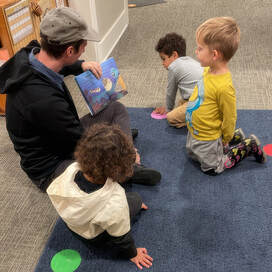We Love to Work and Play
Sunnyside Mennonite Montessori School is operated by the Portland Mennonite Church as a service to the community and church families. The school provides quality early childhood education using the methods of Maria Montessori.
Over 100 years ago, Dr. Maria Montessori, the first female doctor in Italy, began her work with children. She found that children crave independence and approached them with the goal of helping them to do things themselves. With this in mind, lessons are presented to the children, so that they can learn to be independent in everyday tasks and in their life-long learning.
We strive to meet each child where he or she is in all areas: needs for physical activity, needs for quiet, needs for academic learning, needs for fun and games, needs for community, needs for being alone. The needs of children can change quickly, and our time together flows with the needs presented at any given time. Every effort is made by the adults in our community to meet these needs and to stimulate the children to further levels of independence.
Over 100 years ago, Dr. Maria Montessori, the first female doctor in Italy, began her work with children. She found that children crave independence and approached them with the goal of helping them to do things themselves. With this in mind, lessons are presented to the children, so that they can learn to be independent in everyday tasks and in their life-long learning.
We strive to meet each child where he or she is in all areas: needs for physical activity, needs for quiet, needs for academic learning, needs for fun and games, needs for community, needs for being alone. The needs of children can change quickly, and our time together flows with the needs presented at any given time. Every effort is made by the adults in our community to meet these needs and to stimulate the children to further levels of independence.
The three keys to your child's experience at SMMS
|
The Prepared Environment
The classroom and outdoor environments are carefully prepared by the teachers, with children's independence in mind. All of the furniture is child-sized, the shelving is low, so the children can independently retrieve and replace materials as they desire. All materials on the shelves are well-made and self-contained, with all of the supplies needed for that activity. Children at this age have a strong sense of order, so everything has its place in the environment. |
|
The Children
One of the biggest things children of this age are working on is how to live peacefully and respectfully with others. Grace and Courtesy lessons are offered frequently to show the children and allow them to practice respectful ways of interacting with each other. They are also given opportunities to learn how to voice their desires and concerns to others. |
|
The Adults
The adults in the classroom carefully observe the children to learn what kinds of supports and new lessons they might be ready for in the areas of Practical Life, Sensorial, Language and Writing, Math, Sciences, Geography and Cultural Studies and Art. They are frequently evaluating how the children interact with each other and how the children move in the classroom. This leads to guidance for how to tweak the classroom or routines periodically to meet the needs being presented. The adults act as facilitators, or guides, to the children, meeting the needs presented. |
Our school provides a setting in which parents have an opportunity to become involved in meeting various classroom needs. It also provides an opportunity to establish friendships with other parents in the community.



